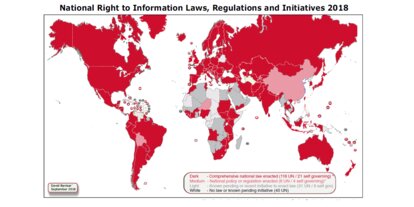Access to Information in the Arab World ... Reality and Expectations

The public’s right to knowledge and information is an important pillar in the democratic construction of any country. Access to information is a prerequisite for citizens to participate in public life and to make wise decisions weighing alternatives in matters including elections, public affairs of the state, debates on policies and draft laws, monitoring of governments, detection of human rights violations, detection of corruption and weakness in government agencies, and setting up commercial and economic projects.
Information fuels dialogue among citizens, helping to bring about the most desirable agreement on political, economic and social issues.
The right of access to information is expressed in various forms such as “Freedom of Information”, “ Access to Information”, or “ Right to Information”. All these mean “the right of an individual living in a society to obtain sufficient information from the administration or authority regulating such society on matters that he wishes to know, including “access to information held by public bodies and entities upon request.” Guarantee of the active free flow of information and ideas is based on the principle that public bodies keep information on behalf of the public. So, access to such information should be facilitated unless there is a reason for non-disclosure.
Sweden was the first country to develop a Freedom of Information Act (FOIA) in 1766 (Finland was part of the Kingdom of Sweden. Hence, UNESCO celebrated World Press Freedom Day in Finland in 1966). After 200 years (in 1966), only four countries had developed such law. In 1990, 18 countries had similar laws.
Since then, access laws have proliferated. Information acts have been adopted by 119 countries, although Arab and African countries are not well represented. The right to information has been included in constitutions of about 74 countries, including Morocco in 2011, Tunisia 2014, Egypt 2014, and Algeria in 2016.

World Map of Access to Information Acts
Aiming to examine this issue in the Arab region, the Friedrich Naumann Foundation for Freedom has cooperated with its partner Arab Reporters for Investigative Journalism (ARIJ) to produce a policy paper. The paper entitled “Access to Information in the Arab World” illustrates the challenges facing the right to information in Arab countries and its status quo, with a due focus on Jordan, Tunisia and Yemen.
This paper targets liberal policy makers, decision makers and relevant researchers in the region empowering them with recommendations for required reforms to improve the legal and practical framework governing access to information among Arab citizens.